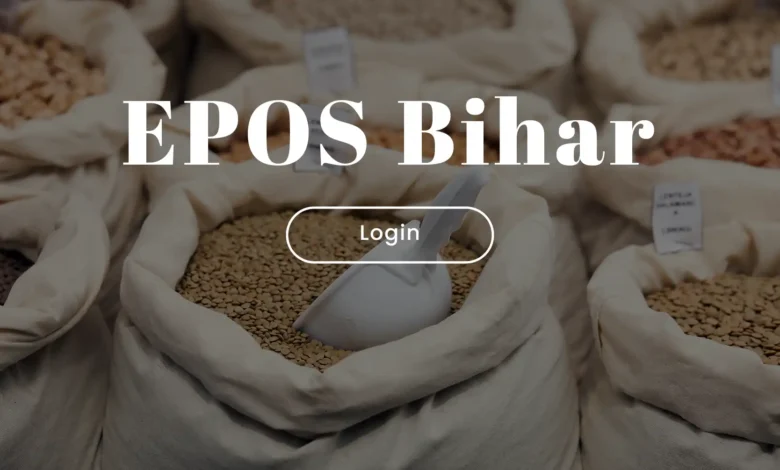EPOS Bihar: A Gateway to Modernizing the Public Distribution System

Introduction
In today’s digital age, technology plays a crucial role in improving governance and delivering services efficiently. One of the most notable advancements in this regard is the introduction of the EPOS (Electronic Point of Sale) system in Bihar, a state in India. The adoption of EPOS technology has brought significant improvements to the public distribution system (PDS), ensuring a transparent, efficient, and user-friendly process for distributing essential goods to the public. But how does it work? Why is it such an important innovation? This article delves deep into the concept of EPOS Bihar, its impact on the PDS, and how it is changing the lives of ordinary citizens.
What is EPOS?
EPOS, or Electronic Point of Sale, refers to a system where transactions are recorded electronically rather than manually. It uses technology, such as barcode scanners, biometric systems, and data processing units, to authenticate and verify transactions. The introduction of EPOS in Bihar is aimed at streamlining the distribution of essential goods like food grains, sugar, and kerosene to eligible families under the Public Distribution System (PDS). This system is designed to replace the traditional methods of distribution, which often faced challenges like leakages, delays, and corruption.
Why EPOS?
Imagine going to a store and getting your groceries. At checkout, you swipe your card, and the system records the transaction instantly. This seamless, error-free transaction is what EPOS systems offer. For the PDS, this translates into a more accurate, faster, and transparent system that minimizes errors and ensures that the goods reach those who truly need them.
The Role of EPOS in Public Distribution System (PDS)
The Public Distribution System (PDS) is one of the most important programs for poverty alleviation in India, ensuring that essential commodities are distributed to low-income families at subsidized rates. However, the traditional method was often marred by inefficiencies. These included improper distribution, leakage of goods, and delays in reaching the beneficiaries. EPOS technology addresses these issues head-on.
How EPOS is Transforming PDS
In Bihar, EPOS has become the backbone of the PDS. The introduction of electronic machines at ration shops has made the process more transparent. Ration cards, linked to Aadhaar (the unique identification system), now act as the key to accessing government-subsidized goods. Beneficiaries have to authenticate their identity through biometric verification, ensuring that only the right person receives the goods. This has significantly reduced corruption, as there is little room for manual tampering or errors.
The Link with Aadhaar
Aadhaar is a 12-digit unique identity number that is linked to an individual’s biometric and demographic details. By integrating Aadhaar with EPOS systems, Bihar has created a foolproof way of ensuring that the right beneficiaries get their share. This has also eliminated the issues caused by duplicate or fake ration cards, which were common in the past.
How EPOS Works in Bihar
Let’s break down how the system works:
- Ration Cardholder Registration: Each eligible household has a ration card linked to their Aadhaar number. This card is used to claim food grains and other essential items.
- Biometric Authentication: At the ration shop, the cardholder’s fingerprints or iris scan are taken to confirm their identity. This step ensures that only the rightful beneficiary can access the ration.
- Transaction Processing: Once authenticated, the EPOS system records the transaction electronically. The details of the transaction, including the quantity of goods received, are logged into a central database.
- Real-time Data: The EPOS system provides real-time data, allowing both the government and the public to track distribution. This eliminates bottlenecks, improves inventory management, and ensures that the system runs smoothly.
Benefits of EPOS in Bihar
The benefits of this technological advancement cannot be overstated. Here are a few of the most notable advantages:
- Transparency: EPOS ensures transparency by eliminating manual record-keeping, which was prone to errors and manipulation.
- Efficiency: The system reduces the time spent on manual processes, making transactions quicker and more efficient.
- Better Monitoring: With real-time data, authorities can monitor distribution, track discrepancies, and take immediate action if necessary.
- Reduced Fraud: The use of biometric authentication prevents fraud and ensures that only legitimate recipients benefit from the scheme.
- Convenience: Beneficiaries no longer have to worry about carrying multiple documents or facing long queues. A simple biometric scan is enough to complete the transaction.
Impact of EPOS on the People of Bihar
For the citizens of Bihar, the introduction of EPOS has brought about several positive changes. One of the most significant impacts is the increase in the accessibility of essential goods. Now, even people in remote areas, who were once excluded from the system, can easily get their ration through EPOS-enabled shops.
Empowering the Poor
The key objective of the PDS is to assist low-income households, and EPOS has made this objective much more achievable. By eliminating leakages and corruption, the system ensures that the intended beneficiaries receive their share. Additionally, the system provides an easier, faster, and more convenient way to access goods, reducing the time and effort required to visit the ration shops.
A Step Toward Digital Inclusion
For a state like Bihar, where digital infrastructure has historically been weak, the EPOS system represents a significant step toward digital inclusion. Many people who may not have had exposure to technology are now interacting with it on a daily basis, whether it’s for biometrics or checking their rations. This gradual exposure is helping to bridge the digital divide.
Challenges Faced in Implementing EPOS in Bihar
Like any large-scale technological shift, the implementation of EPOS in Bihar has not been without its challenges. Some of the common issues faced include:
1. Connectivity Issues
Bihar’s rural areas often suffer from poor internet connectivity. Since EPOS systems require an internet connection to update transactions in real time, this has led to delays and occasional failures in authentication.
2. Awareness and Training
While EPOS systems are relatively simple, some ration cardholders and shopkeepers may not be fully aware of how to use the technology. This requires constant training and awareness programs to ensure that everyone can use the system effectively.
3. Technical Glitches
Like any technology, EPOS systems can experience technical glitches. From system crashes to data syncing issues, these problems can disrupt the smooth functioning of the system.
4. Infrastructure Challenges
Bihar faces infrastructural challenges such as electricity shortages and inadequate technical support. Ensuring that every ration shop is properly equipped and maintained requires ongoing investments.
Future of EPOS in Bihar
The EPOS system in Bihar has shown promising results, but there is still much to be done. As technology evolves, the system can be enhanced in various ways:
1. Integration with Other Government Schemes
In the future, it is likely that the EPOS system will be integrated with other government schemes, such as those related to healthcare and education. This will create a more streamlined, efficient, and comprehensive system for providing benefits to the public.
2. Incorporating Artificial Intelligence
Artificial intelligence can be used to improve decision-making and prediction models. For example, AI can predict demand and supply for essential goods, making distribution even more efficient.
3. Expansion of Services
The EPOS system can expand beyond the PDS to include other services, such as pension schemes, direct benefit transfers, and even e-governance services.
Conclusion
The implementation of the EPOS system in Bihar has significantly transformed the way essential goods are distributed through the Public Distribution System. By ensuring transparency, reducing fraud, and making the process more efficient, it has empowered both the government and citizens. While challenges remain, the system’s potential to revolutionize public service delivery in Bihar is clear. As technology continues to improve, so too will the opportunities for expanding and enhancing the EPOS system, creating a more efficient and equitable society.
Frequently Asked Questions (FAQs)
1. What is EPOS in Bihar?
EPOS stands for Electronic Point of Sale, a system used to authenticate and record transactions in the Public Distribution System, ensuring efficient and transparent distribution of goods.
2. How does EPOS reduce corruption?
By using biometric authentication and eliminating manual record-keeping, EPOS ensures that only the intended recipients receive their share of goods, significantly reducing opportunities for corruption.
3. What challenges are faced during the implementation of EPOS in Bihar?
Challenges include poor internet connectivity in rural areas, a lack of awareness among beneficiaries, and occasional technical glitches in the system.
4. How has EPOS improved the lives of people in Bihar?
EPOS has made the distribution of essential goods more efficient, accessible, and transparent, benefiting low-income households and reducing time spent at ration shops.
5. What is the future of EPOS in Bihar?
The future includes expanding the system to integrate with other government services, incorporating artificial intelligence, and further improving the system’s infrastructure to cover more areas.
5


